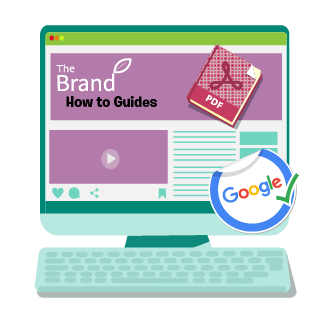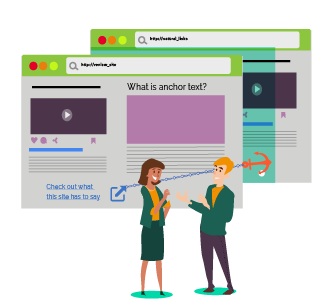When someone visits your website, Google wants to know that the user is reading content which is fully relevant to their search intent. If they have, then they’ve done their job correctly.
This is why it’s crucial that each of your website’s pages are fully optimised. If not, Google won’t know which key terms or what your pages should be ranking for.
It is easy to get cracking with on-page SEO
On-page SEO is pretty straightforward. There are plenty of easy changes you can implement right now for it to have a positive impact on your website in the long-term.
Yes, on-page optimisation is one of those SEO strategies that have been around a long time. And you’ve probably heard lots about it.
You can’t afford to avoid on-page SEO; you need to do it properly in order to succeed. If you don’t do it at all, or don’t make a decent job of it, you will harm your site’s ability to rank highly – or at all.
With 75% of internet users never scrolling past the first page of search results, you need to give your website the best chances of success with SEO, so that you can reach that hallowed first page spot.
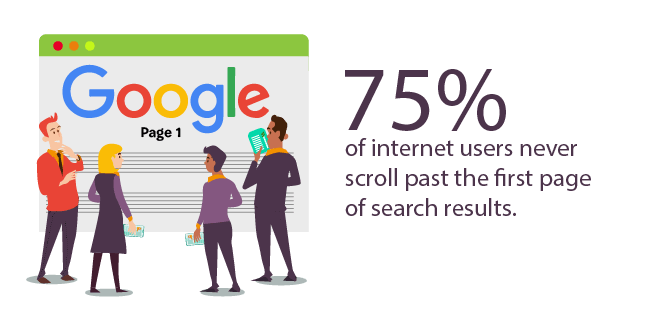
A lot of on-page SEO is relatively simple and there are key changes you can begin making right now. Changes which will have a long-term positive impact on your website. The sooner you start, the sooner you will see results.
I’ll talk you through everything you need to do in this article, help you to master the basics, rank higher, increase your site traffic and those all important conversions
What is on-page SEO?
On-page SEO is the process of optimising the specific elements on your website’s pages (both your content and HTML code) in order to rank higher on Google and drive more traffic from search engines.
It’s not just about satisfying Google though.
On-site SEO is also about satisfying your customer. If done correctly, it can help your users to understand what your webpage is about and decide whether the content is right for their search query.
Good on-page SEO will also help Google to decide what is on your webpage and whether it’s relevant to the end-user’s search query. If it is, you have satisfied the reader.
The reader, in turn, will read your content and will be likely to return to you for more information as you have proved yourself as an authoritative voice on the topic.
Think of on-site SEO as being the process of making it easy for both Google and the end-user to decipher what your website is about, and whether it’s relevant and useful.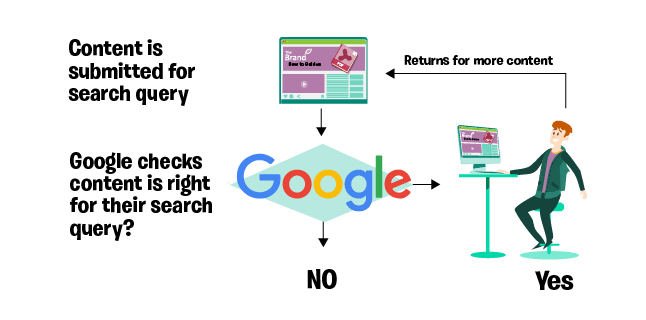
On-page optimisation allows you to discover and satisfy new customers
Every piece of on-page optimisation has one goal: to satisfy the end user.
When making your on-page optimisations, you should always ask yourself; ‘is this going to improve the overall user experience?’
If the answer to this is yes, then you’re doing it right.
In the noisy marketplace of the internet, optimising your webpages properly helps you to get noticed as Google increases your rankings on search engine results pages (SERPS).
With the fast-paced nature of search engines, it’s essential you maintain great website optimisation to get the most out of these organic marketing opportunities. Otherwise, you’re literally throwing away free ad space and missing out on potential sales traffic.
In addition, with complex algorithms and continuous updates all playing a significant role in determining where you rank on Google, it’s important that you’re always on top of your game when it comes to on-page SEO.
It’s more than just keywords
Historically, SEO was purely about including keywords on your webpages.
That’s no longer the case, that said, keywords still matter.
Today, search engines are more sophisticated and consider things other than keywords to determine where a webpage should rank.
Simply optimising keywords on your pages is not enough on its own to drive the traffic that you need to make long-term success online.
While keywords matter, relevance is more important.
Google judges whether the keywords and content you are publishing are relevant and make sense to users. If they don’t, you won’t rank (or rank very highly).
Now, SEO is more about understanding who your visitors are and what they want, as opposed to keyword repetition and quick tactics. It’s a lifestyle change that forces you to shift your focus to the purpose of your content.
By knowing who your visitors are, you can perform keyword research and use that to create content that’s relevant to them. This is the best way to optimise your pages and increase your chances of ranking.
You’ll notice that the best optimised pages have content which is –

- Unique: Duplicated or similar content from other sites will be caught by Google and can stop you from ranking completely.
- Authoritative: Your content needs to be reliable and trustworthy in its own right – will users learn all they need to know from your page alone?
- User-Friendly: Content needs to be easily readable and organised in a way which is easy to access. It also needs to be clean so try to avoid over-using ads or links.
- Thorough: Your content needs to be in-depth and enriching if you want to stand a chance at ranking.
So, what does effective on-page optimisation look like?
Every piece of content online is different (or should be), and there’s no perfect, fail-proof template to success. Just try to make sure each piece of content you publish is authentic, keeping it unique to your audience and the intent of their search.
From its overall appearance to its content and the back-end technical aspects, the perfectly optimised page incorporates virtually all aspects of SEO.
High quality content which offers relevant advice whilst also focusing on relevant keywords; it uses internal and outbound links; has properly written meta tags, titles and descriptions; and, has marked-up structured data and a design which prioritises mobile devices. These things should all be included on a perfectly optimised page.
With some hard work and determination, you can optimise all of your website’s pages in this manner.
Just remember, to be successful at content marketing, it’s a long-term time investment which requires lots of skill and research. You may not see the results you want at first, and you may need to adapt your content to better suit your target customer’s queries. However, once you’re successful at it, the benefits present endless opportunity.
By ensuring your pages provide Google with all the right signals through good content, optimised code, use of title tags, headings and meta tags, you will also provide your visitors with all the information they want and need.
When you’ve done all your optimising and you are happy with your work, track your site’s performance by using Google Webmaster Tools and Google Analytics.
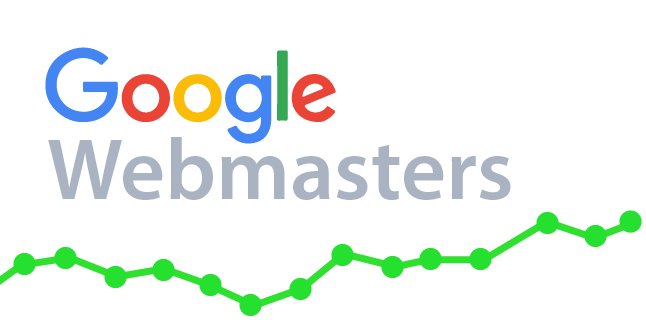
Considering an SEO marketing consultant
Although on-page SEO is relatively simple, it’s a time-consuming process which requires ongoing attention. This is where you have to decide where to focus your time effectively, without hindering the success of either your business or your on-page SEO.
If this is the case, then outsourcing your on-page SEO and other digital marketing tasks may be a good idea. If this idea is of interest to you, then feel free to get in touch for an obligation-free chat.
Even if you’re not interested in my services but want to ask a couple of questions, I am more than happy to help guide you in the right direction.
Alternatively, you can learn more about SEO in general by visiting my blog.
